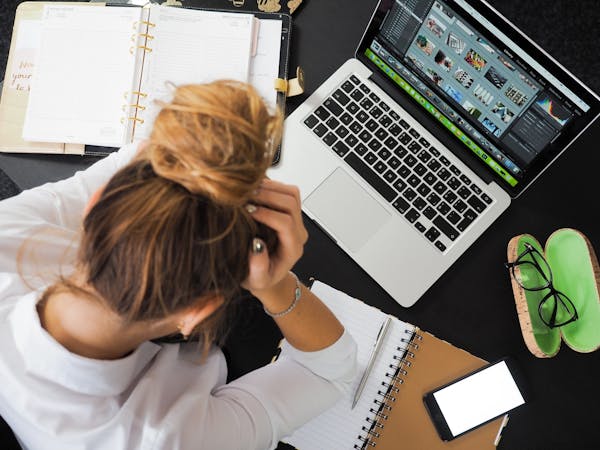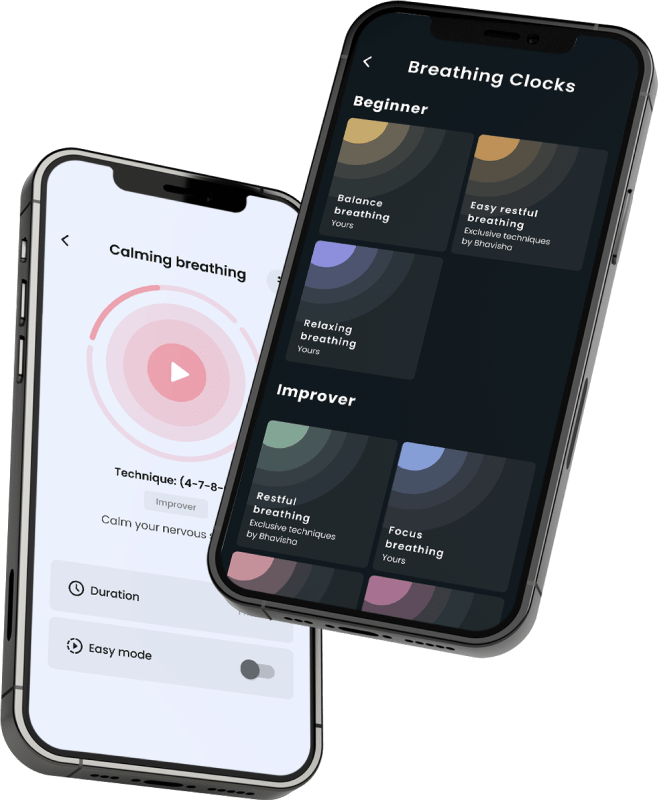Can Stress Cause Vertigo?

While nearly 40 per cent of people will experience vertigo in their lifetime, it is not considered a medical condition but a symptom of other underlying medical issues. These can range from viral infections, or central nervous system problems, to inner ear or hearing issues. Many people notice vertigo more when they are experiencing stress or anxiety disorders. We'll look more at this link between stress and vertigo symptoms and explore when to seek medical help.
According to the British Medical Journal, the most common causes of dizziness are benign paroxysmal positional vertigo (BPPV), Meniere's disease, and labyrinthitis or acute vestibular neuronitis. Discovering the cause of your dizziness will determine your treatment options.
What Is Vertigo?
Vertigo is an illusion of motion whereby you feel your surroundings are spinning or tilting. It's a sensation of extreme dizziness and loss of balance and, in the worst cases, may cause sufferers to feel sick from the giddy feelings. The episodes may only last for a few seconds, but for some sufferers they can last for many weeks or months.
Why Do People Get Vertigo?
Around 90 per cent of vertigo cases are due to one of the following three conditions:
- Benign Paroxysmal Positional Vertigo (BPPV) - BPPV occurs when when tiny calcium carbonate crystals (canaliths) break free from their normal location and collect inside the tubes of the inner ear. This is particularly problematic because your inner ear sends signals to the brain and body about head movements and which in turn helps us balance. BPPV is the most common cause of vertigo and typically results in short episodes that last anything from a few seconds to a few minutes. There is no known reason why you may suffer from BPPV although age may be a factor.
- Labyrinthitis or vestibular neuritis - an inner ear problem in which swelling and irritation occurs, usually due to a viral infection. This affects the inner ear's ability to help the body sense balance. For these sufferers, vertigo can come on very suddenly and may go hand in hand with hearing loss.
- Meniere’s disease - this is caused by excess fluid building up in the inner ear and the subsequent changes to pressure in the ear resulting in inflammation. People with Meniere’s disease often experience episodes of vertigo that are more intense and longer lasting than in the previous causes. It can also bring on a ringing in the ears (tinnitus), blocked ears and hearing loss. Meniere's does not have a known cause but, as with labrynthitis, there is a link to viral infections in the inner ear, as well as allergies and head injuries and genetic conditions.
Less common reasons for vertigo may be:
- Head or neck injury
- Brain conditions such as stroke or tumour
- Migraines
- Ear and hearing conditions
- Pregnancy
- Anxiety disorders
- Parkinsons disease
Symptoms of Vertigo
People typically feel the following sensations when suffering from vertigo:
- Spinning
- Swaying
- Surroundings are moving or rotating
- Tilting
- Unbalanced
- Being pulled in one direction
Other symptoms that may accompany vertigo in more extreme cases are:
- Nausea
- Vomiting
- Abnormal or jerking eye movements (nystagmus)
- Sweating
- Headaches
- Ringing in the ears (tinnitus) or a degree of hearing loss
What Is the Difference between Vertigo and Dizziness?
We've all had feelings of dizziness but how do we know when it's classed as vertigo? Audiologist Dr. Julie Honaker, PhD, explains: "It used to be that dizziness was the umbrella term and vertigo fit underneath it. But now we’re finding that dizziness is very separate from vertigo.”
The sensation of spinning is what is key to vertigo. In true vertigo there is a strong sense of motion that people who complain of dizziness won't always feel. Dizziness is seen as an altered sense of spatial orientation where your balance doesn't feel right, but vertigo sufferers will feel either as if they are moving or spinning or their surroundings are.
“Vertigo can be very debilitating,” continues Dr. Honaker. “It can bring on other symptoms of imbalance too. I think the scariest thing is the fact that it comes on so abruptly. Even though it’s very short, it’s a very, very strong response.”
How to Prevent Vertigo Brought On by Stress
When we are stressed or anxious we often take shallow breaths or hyperventilate, which interferes with the supply of oxygen to the brain and can result in vertigo symptoms. To reduce feelings of stress and anxiety, establishing the cause of key. By taking control of the situation, having a good emotional support network around you and trying out tried and tested stress-busters you can help ease those feelings.
Taking some 'me time' is vital to provide much needed relaxation and for body and mind to recoup from busy days. Here on Yours app, we showcase hours of mindful meditations you can dip in and out of depending on your mood which are proven to relax and calm your mind. Or why not drift off to sleep one of our soothing sleep stories read by a range of different voices?
Exercise is proven way to clear your head and help blood flow and endorphins flow around the body. Whether it's a 15-minute brisk walk around the block to your favourite songs, a team sport with friends or practising the power of yoga with one of Yours app's expert yoga masters, an active session which gets your heart rate up and blood pumping is guaranteed to make you feel calmer and more balanced.
Talking through your problems with a friend or trusted person can really help gain perspective on issues you may have thought were big but are actually are very manageable. Just remember not to lean on smoking, alcohol or caffeine! They might provide short term benefits for some but you're not tackling the root of the issue. Check out the NHS website for more tips of dealing with stress.
When should I see a doctor?
We've all had those funny episodes of feeling dizzy but how do we know when it's so bad we should we see a GP? Most cases of vertigo get better without treatment and treatment will, of course, depend on the cause. If vertigo is brought on by an infection, doctors will treat it with antibiotics, otherwise antihistamines can sometimes help with vertigo symptoms.
Often, vertigo will get better without treatment but if it is affecting your daily life make an appointment with your GP. In the meantime, there are certain exercises and things you can do to reduce symptoms and frequency of attacks:
- Lie still in a quiet, dark room and when you move, make sure the movements are slow
- Sit or lie down as soon as you start to feel dizzy
- Drink plenty of fluids to stay well-hydrated
- Turn on lights if getting out of bed during the night
- Use a walking stick if you feel you're unsteady on your feet
- Sleep with your head slightly raised on two or more pillows
- Get out of bed slowly and sit on the edge of the bed for a while before standing up
- Try to relax

